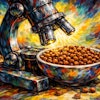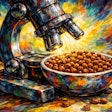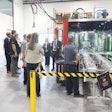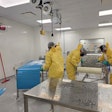Kim Ryan, president and CEO of Hillenbrand, and Kevin Buchler, president of Coperion Food, Health and Nutrition Division, formally dedicate the Coperion ZSK Food Extruder to the students and staff at Purdue University. Accepting the donation is Alyssa Wilcox, chief of staff, Office of the President and Senior Vice President for Partnerships at Purdue.
The extruder will be used by the Department of Food Science—College of Agriculture and the Food Entrepreneurship and Manufacturing Institute (FEMI) at the university. The extruder is designed to the top of its class in both technology and innovation. This co-rotating twin screw extruder includes the latest in controls capabilities, customized configurations and process parameters to allow the study of emerging markets such as plant-based meat substitutes, hemp, the production of cereals, snack foods including puff snacks, pet food and the development of many new extruded processed food products. To complement the extruder, the donation includes two Coperion K-Tron loss-in-weight (LIW) feeders, for powders and liquids, designed with the latest generation of controls and load cells to ensure the highest accuracy of ingredient delivery to the extruder.
“This is a huge win for all, and Purdue is very excited about the partnership. The students and staff are ready to conduct research on the new state-of-the-art extruder with all the bells and whistles”, says Allison Kingery, executive director Life Science and Agriculture at Purdue University. “The new extruder replaces a working 25-year-old Coperion extruder, but we are looking forward to having a new, up-to-date extruder that includes new controls and new technology. This is a major donation for the students; they will be able to say they have utilized a modern, highly engineered extruder while in school and will be that much further ahead when graduating. The students will certainly benefit from utilizing a machine with such an exceptional reputation in the food industry.”
Kingery goes on to say, “Purdue and Coperion already has companies eager to sign up for the use of the extruder, from smaller start-up companies to large corporations. The setup at the university includes a full-scale kitchen next to the plant. The addition of the extruder to the test lab will not only open opportunities for the testing of products but also will allow the study of the final extruded product to be used in the kitchen and basically bring the product to life. A full 360-degree loop from development, to research to design. Nutritional analysis will also be done at the university from the products produced by the extruder. This is such a broad opportunity for the students at the university.”
The Coperion ZSK 27 Food Extruder in Hybrid Version entertained guests during live demonstrations held at the dedication event. The donation included two Coperion K-Tron loss-in-weight feeders for the addition of powders and liquids.
Meet the Coperion ZSK 27 Extruder in Hybrid Version
The Coperion ZSK 27 twin screw extruder in hybrid version is the ideal extrusion system for research and development and offers a variety of options that ensure maximum flexibility and easy handling. The twin screw extruder's stainless steel design fulfills the highest hygiene requirements and makes fast, efficient cleaning and recipe changes a reality. The extruder consists of a modular process section with several barrels in which the co-rotating screws operate. The closely intermeshing screws with their tight, self-wiping profile eliminate stagnant zones over the whole length of the process section. The result is a consistently high conveying efficiency and raw material efficiency due to the perfect self-cleaning of the screws. The modular design and its unusual combination of free screw volume, screw speed and torque enable this twin screw extruder to be individually configured for every application. Due to this high flexibility, the extruder is ideally suited for research tasks and recipe development. With its 10.6 Nm /cm3 specific torque and maximum screw speed of 1,800 min-1, the machine achieves throughputs of 10 to 100 kg/h, depending upon the end product.
In addition, this food extruder in hybrid version can be used for manufacturing Textured Vegetable Protein (TVP) and High Moisture Meat Analogues (HMMA) on the same machine. The product’s final structure is created by using the Coperion ZGF centric food pelletizer for TVP or a cooling die for HMMA. Using an adapter solution, the extruder’s discharge can be switched from the centric pelletizer to the cooling die in no time at all.
Coperion K-Tron Feeders are the Cherry on Top
When designing an extrusion line, accurate delivery of the individual ingredients, both powders and liquids, to the extrusion process is critical to process stability and product quality. For this reason, Coperion supplied a highly accurate twin screw LIW feeder for the powder addition and a liquid LIW feeder for the liquid addition to Purdue along with the extruder. The newest Coperion K-Tron load cells coupled with a new and improved KCM-III controller ensure the most accurate product delivery to the extrusion process.
Coperion K-Tron consistently strives to provide innovative solutions for a wide variety of food processing applications, with an emphasis on efficient material handling techniques for even the most difficult-to-handle ingredients. Many food ingredients, such as protein-based powders, have very poor flow properties, making them difficult to handle and deliver accurately to the process. The overall design of the twin screw hygienic model KT20 feeder supplied to Purdue optimizes the overall feeder performance with poor flowing materials and also reduces cleaning and changeover times. A special cantilevered stand that can be raised and lowered allows for easy access during maintenance.
For the liquid loss-in-weight system, a custom-designed skid including Coperion K-Tron SFT load cells ensures more accurate delivery of the liquid component to the extruder than traditional flow meter technologies. For both liquid and powder feeders, the latest generation KCM-III controller, with its new powerful CPU, extended memory and optimized control algorithms, ensures faster communication with the feeder and pump drives, weighing systems and peripherals.
In combination with the latest generation of SFT load cells, the KCM-III also offers a significantly higher weighing resolution of 8,000,000:1 in 20 ms. This leads to better short-term feeding accuracy as the control system reacts quickly to changes in the system, a critical component to optimized extrusion performance. Finally, for the recording of process data on the Purdue system, where traceability is becoming more and more important, the KCM-III automatically stores up to seven days of log and event files, as well as trace and process data.














